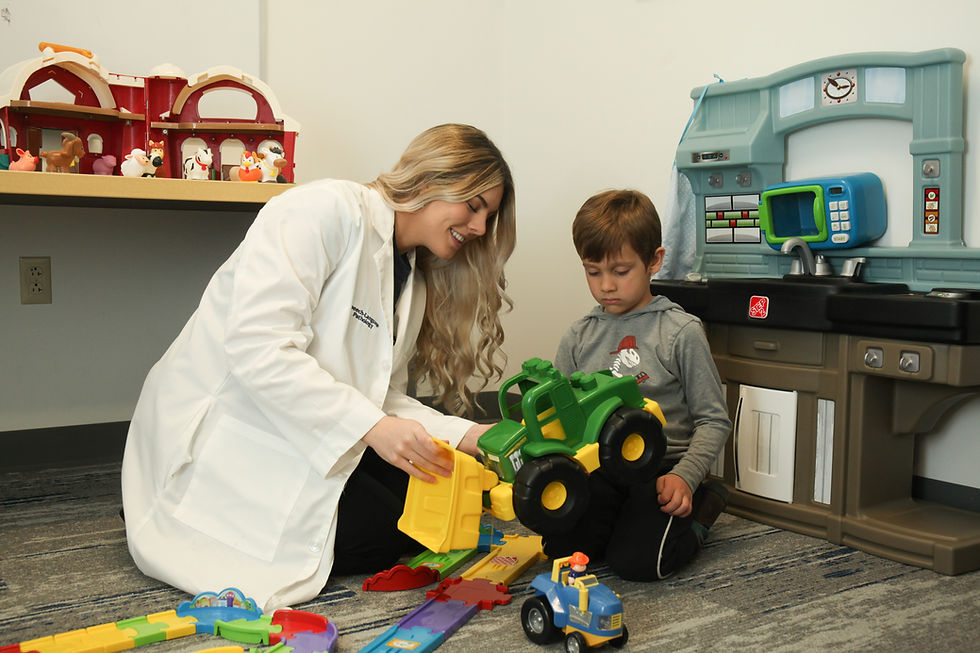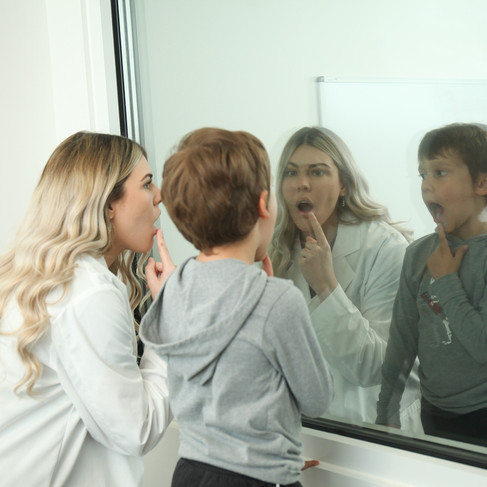Thiel College Speech-Language Pathology Program Provides Students with Valuable Clinical Experience
- Shari Berg
- Jul 30, 2022
- 4 min read
Updated: Aug 31, 2022

The Thiel College graduate Speech-Language Pathology program, as well as the on-campus Center for Speech-Language Services, was launched two years ago. The Center for Speech-Language Services serves a dual purpose, providing free speech, language, cognition, and voice evaluations and treatment as well as hearing screenings. The Center also provides Thiel graduate students in the Speech-Language Services degree program with an opportunity to gain valuable clinical experience.

Located in the Glen Johnson Center on Thiel’s campus, the clinic had the misfortune of opening right as the pandemic was in full swing in summer 2020. Despite the unlucky circumstances, the students enrolled in the first cohort made the best of the situation.
“We used teletherapy and Simucase, a clinical simulation program, for clinical practicum experience during the first semester because we couldn’t do face-to-face appointments,” said Dr. Mary Beth Mason, program director. Dr. Mason has overseen the graduate program since its inception. She also serves as the chair for Thiel’s Communication Sciences and Disorders department.
Since COVID, telemedicine has expanded. So, what could have been a major disadvantage to that first semester of students admitted to the program ended up providing valuable insight into a growing healthcare alternative. “We still provide teletherapy to clients who request it,” said Dr. Mason.
It’s just one of the many benefits health sciences graduate students enjoy through the clinic. The clinic serves all age groups, giving the students a unique opportunity to discover where they may fit into the field after graduation. “Our goal is for them to get experience across the lifespan,” said Dr. Mason.
Since its opening, the free clinic has served 485 clients in the following age groups:
60 children through Zion Preschool screenings
200 children in local school districts through the Success by 6 program
100 children in the Sharon School District as part of annual screenings
40 children from Pymatuning Valley School District as part of annual screenings
20 Pre-K students received screenings on-site at the Glen Johnson Center clinic
65 additional clients across the age spectrum sought one-time evaluations
Giving students an on-campus experience before they step out into the real world for an external clinical externship is a nice stepping stone for them, said Dr. Mason.
“The services they perform in our on-campus clinic with faculty mentors to supervise and guide them with a small number of clients helps them develop the professional skills they need to succeed in their future careers,” she explained.
Madeleine Campbell was part of the second cohort of students to go through the Thiel graduate program. She was an undergraduate at Geneva College when Dr. Mason visited there to present students with the option to continue in Thiel’s program.
Campbell said the accelerated program—which takes 14 months to complete—appealed to her because of how quickly she could finish it. She also found the on-site clinic a valuable option for preparing her for a future career in her field.
“It was different than what I expected,” she said. “I thought it would be easier than an external clinical practicum, but they had high expectations. It was good to have those high expectations right off the bat.”
Campbell said that the professors who supervised her and the other graduate students were available to answer questions and to help in any way. “It was nice because we weren’t experts in our field yet, and we had someone to guide us if needed.”
Campbell said that one of the biggest advantages of going through the program was the push toward coming up with her own ideas for treating patients.

“You have to do your own research and come up with your own ideas because that’s what’s going to be expected of you in the professional setting,” she said. “You’ll be the expert, so you need to figure those things out on your own.”
She added that the program also taught her valuable interpersonal skills she’ll need to treat patients.
Katelyn Oyler graduated from Thiel’s Master of Speech-Language Pathology program last year and was part of the first cohort for the clinic. What she liked most about the program was the access to clinical experience from the first day of classes.
“The pandemic challenged us, and we had to find workarounds because of the restrictions in how we could treat patients,” she said. “Having the virtual experience helped my cohort become more adaptable and be able to think on our feet. That virtual component gave us an advantage and put us a step ahead.”
Some of the other lessons she had during her Thiel clinical experience prepared her well for a situation she faced during her job at UPMC Children’s Hospital of Pittsburgh. She had a patient come in that she wasn’t expecting, leaving her about five minutes to prepare for the session.
“I had to remind myself that we are the experts. I had to think quickly and come up with a plan,” she said. “I was thankful in that moment for Dr. Mason because she gave us the tools we needed to become well-rounded clinicians.”
You can learn more about the program and its campus clinic at https://bit.ly/thielSLPclinic.
























Comments